 Meritorious Artist Dam Han Giang has never stopped trying to bring ballet closer to the Vietnamese audience. Meritorious Artist Dam Han Giang has never stopped trying to bring ballet closer to the Vietnamese audience. |
“Ballet is my flesh and blood, my whole life. Only if I were paralysed would I stop dancing and teaching ballet.”
To Vietnamese ballet fans, Meritorious Artist Dam Han Giang is known as the “Ballet Prince.” When Giang put on his first pair of ballet shoes at the age of 6, he knew he had found his calling.
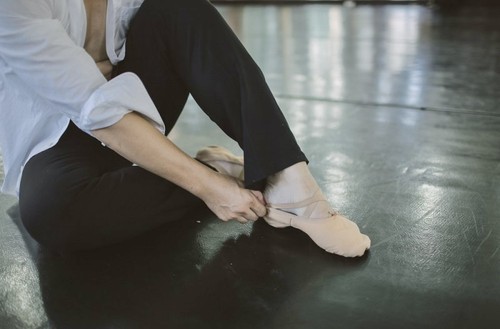 When Giang put on his first pair of ballet shoes at the age of 6, he knew he had found his calling. When Giang put on his first pair of ballet shoes at the age of 6, he knew he had found his calling. |
Giang was invited to work as first soloist at the world-class Hong Kong Balle, one of Asia’s premier ballet companie, in 2007 after studying abroad. He rejected this golden opportunity to get closer to the world’s top ballet stages and returned to Vietnam, where ballet wasn’t popular and well-developed at the time.
His reason for returning was simple and touching. “I owed my dad and my motherland a lot,” Giang said.
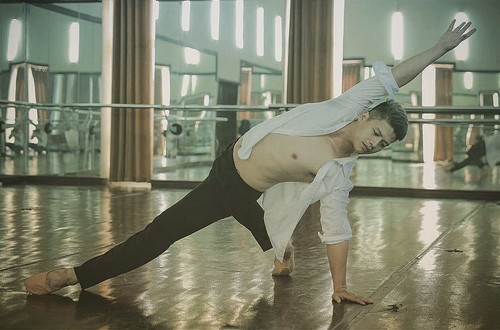 Meritorious Artist Dam Han Giang. Meritorious Artist Dam Han Giang. |
“I was born into a family steeped in the arts and my dad led a strenuous life to raise me. He used to be a ballet dancer and was head of the Art Troupe of Military Region 1,” said Giang.
When Giang began his ballet study at the Vietnam Academy of Dance in Hanoi, his father left his position to work as a custodian at Giang’s school for 7 years to take care of him and make sure that he focused on ballet.
“My family was very poor at that time. From my house in Thai Nguyen province to Hanoi was about 100km, but my dad took me by bicycle many times, rain or shine. He accepted all the difficulties, and sacrificed his own career to support my success.
If everyone stayed abroad, what would happen to Vietnamese ballet? I came back because I wanted my dad to see me perform world-class ballet in my native land", said Giang.
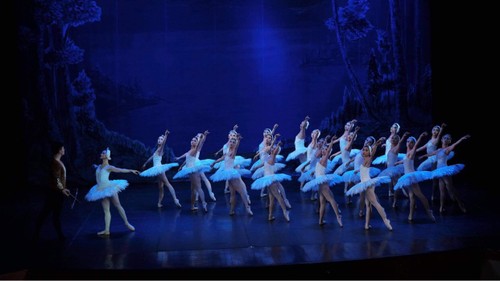 Meritorious Artist Dam Han Giang and his colleagues perform on the stage. Meritorious Artist Dam Han Giang and his colleagues perform on the stage. |
Known for requiring immense discipline, ballet is said to be one of the world’s most difficult and strictest performing arts. Ballerinas are constantly battling gravity and the discipline’s jumps, twirls, and complex movements leave the body trembling. But Giang doesn’t regret his burning passion for ballet, because “those lessons create fearless artists who know that hard work, sacrifice, and determination are essential to all aspects of life.”
He said, “The moves and positions of ballet are sophisticated and exquisite. Practicing ballet made me more disciplined, agile, durable, flexible, balanced, self-controlled, and coordinated.”
“As a ballet dancer you can’t quit every time your feet hurt. I couldn’t pack up all my equipment just because my toes were bleeding, and my legs were throbbing, because I knew that quitting would hurt more than the physical pain I was experiencing at that moment.”
“I understood that sacrifice is required for things that are worth not letting go, and I’m the same way when it comes to other important things in life. I know that I can bleed for what I love, which is ballet.”
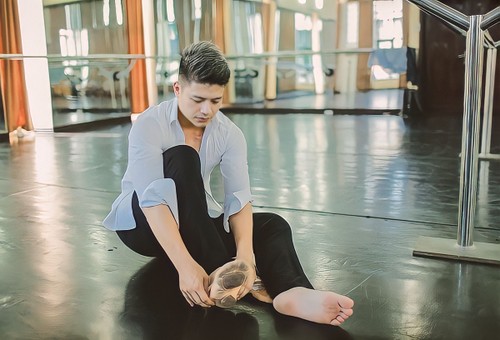 Giang never thought of giving up and stayed committed to Vietnamese ballet. Giang never thought of giving up and stayed committed to Vietnamese ballet. |
The journey to gain a foothold for ballet in Vietnam was tough. Giang said he was a choreographer and soloist at the same time, so creating a ballet and rehearsing it with his company and on his own, simultaneously, left him just a few hours a day to rest and eat. And that have gone for years.
“However, when I came to the stage and saw that very few spectators were coming to see our performance, when I put a great deal of effort into a ballet and not many people paid attention to its premier, it was disheartening not only for me, but also for other dancers.”
“Though I was upset, I was the one who had to stay positive and cheer other people up. It was arduous and fatiguing for me at the time, but I never thought of giving up and I stayed committed to Vietnamese ballet, even though many colleagues of mine quit the stage. I think it was only because my passion for ballet is indestructible,” said Giang.
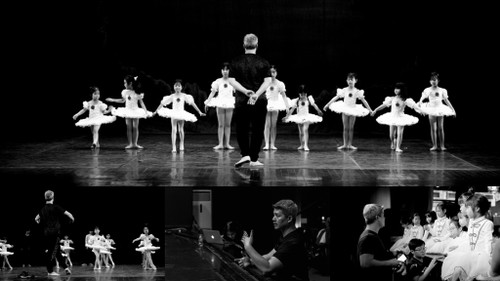 With his tireless efforts, Giang has succeeded in gradually changing the Vietnamese audience’s perceptions of ballet. With his tireless efforts, Giang has succeeded in gradually changing the Vietnamese audience’s perceptions of ballet. |
Ballet is about commitment, and there is a niche audience that loves ballet.
But Giang noticed that there is a huge audience for folklore in Vietnam. He came up with new way to bring ballet closer to Vietnamese people.
He staged classical masterpieces like Paquita, The Nutcracker, and Carmen meticulously choreographed to appeal to the public by incorporating familiar elements of Vietnamese folklore.
Giang was successful in gradually changing the Vietnamese audience’s perceptions of ballet.
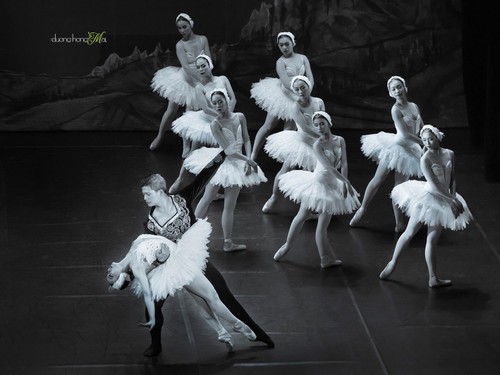 Granted the title “Meritorious Artist” when he was only 30, Dam Han Giang has become Vietnam’s youngest meritorious artist until now. Granted the title “Meritorious Artist” when he was only 30, Dam Han Giang has become Vietnam’s youngest meritorious artist until now. |
“There are various ways to bring ballet closer to the public, but it requires the choreographer’s ingenuity and outstanding performances by dancers on the stage to win the hearts and minds of the audience.
If you do it by halves, you will make the audience even more confused and hesitant to embrace ballet.”
Giang has proved that his decision to return to Vietnam and dedicate himself to Vietnamese ballet was judicious. In recent years, tickets to his shows have sold out, ballet fans have flocked to the theater to see his performances and choreography, and his fans call him "the ballet prince of Vietnam."
 Giang wins a gold medal at the 2019 Asia Art Festival. Giang wins a gold medal at the 2019 Asia Art Festival. |
He has taken Vietnamese ballet abroad by participating in international competitions, winning a silver medal at the 2018 Asia Art Festival, and a gold medal at the 2019 Asia Art Festival, the first time any Vietnamese entry has won this award.
For his contribution to Vietnamese ballet, Giang was awarded the title “Meritorious Artist” by the State in 2016, becoming Vietnam’s youngest meritorious artist ever.
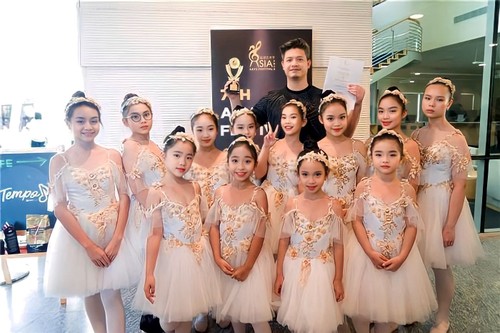 Meritorious Artist Dam Han Giang and his students at the 2019 Asia Art Festival. Meritorious Artist Dam Han Giang and his students at the 2019 Asia Art Festival. |
But Giang didn’t rest on his laurels. He has continued his career by training a new generation of dancers for Vietnamese ballet.
Giang is now preparing to open a branch of The Royal Ballet School in Vietnam and has run a center called “Hanoi Kids’ Art Center” to teach ballet to students as young as 6.
He is directly involved in recruiting and teaching students. The center is now training about 700 students. He trains the students and takes them to international and domestic competitions.
"When I watch them perform on the stage and witness their achievements, I see myself, my own dreams, and my pride. I will invest everything I have in my teaching because the next generation are seeds that will help me pass on my passion for and knowledge of ballet", said Giang.